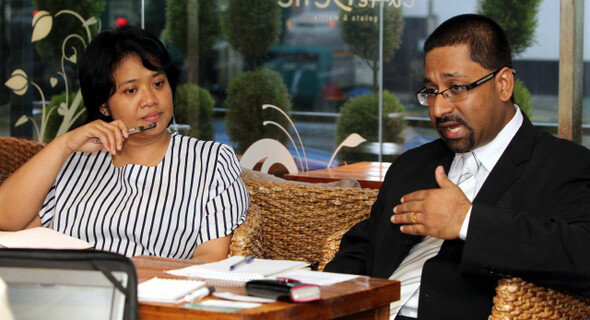hankyoreh
Links to other country sites 다른 나라 사이트 링크
Amnesty International reports curtailed human rights under Lee administration

By Lee Moon-young
Amnesty International issued a report Thursday expressing profound concerns about the suppressions of freedoms of expression, conscience, assembly, and association under the Lee Myung-bak administration in 2010.
The South Korean office of the international human rights organization held a press conference Thursday on the nineteenth floor of the Korea Press Center in Seoul’s Central District to announce the findings of a 2011 Amnesty International annual report on the global human rights situation in 2010.
The group noted an increase in the number of cases where critics of the South Korean administration were suppressed through laws with vague provisions, including the National Security Act and defamation laws. Police made 151 arrests on violation of the National Security Act in 2010, compared to forty in 2008 and seventy in 2009.
Park Jin-ok, head of the South Korean office’s campaign office, said, “Last year’s Cheonan and Yeonpyeong Island incidents have given rise to terror politics that have curtailed domestic freedoms of expression and thought.”
As a representative case, the organization cited prosecutors’ December request for a sentence of seven years against professor and Socialist Workers League of Korea member Oh Se-chul on charges on violating the National Security Act. Also noted by Amnesty International as a violation of freedom of expression was prosecutors’ consideration of pressing charges of defamation, obstruction of official duties, and security law violations against People’s Solidarity for Participatory Democracy in March 2010 after the group sent a letter to the United National Security Council regarding questions about the Cheonan’s sinking.
Cited as suppressions of freedom of assembly and migrant worker rights, respectively, were the barring of entry to a Filipino activist ahead of the G20 Summit in November and an incident where an undocumented Vietnamese migrant worker died while fleeing an immigration official.
Meanwhile, speaking to the Hankyoreh at a cafe in Seoul’s Seocho neighborhood Wednesday, Poengky Indarti, executive director of the Indonesian human rights watchdog Imparsial, and Balasingham Skanthakumar, head of Sri Lanka’s Law and Social Trust - Economic, Social & Cultural Rights Programme, both expressed concern about the inactivity of the National Human Rights Commission of Korea (NHRCK).
Indarti and Skantakumar, who are visiting South Korea as part of an Asian NGOs Network on National Human Rights Institutions (ANNI) investigation group, began an investigation Wednesday into the situation which NHRCK, in which they have focused on a controversy over violations of its independence since Hyun Byung-chul was appointed chairperson by President Lee Myung-bak.
Indarti said, “Looking at South Korea’s civic movement continuously since the 1980s, I had the thought that it should be used as a model for the civic movement in Indonesia.”
“Seeing the way human rights have regressed following a change in regimes even in a country where democracy was established through the power of the citizenry, I have become concerned about Indonesia’s future as well and feel that further regressions should be prevented,” she added.
Please direct questions or comments to [englishhani@hani.co.kr]
Editorial・opinion
![[Column] Season 2 of special prosecutor probe may be coming to Korea soon [Column] Season 2 of special prosecutor probe may be coming to Korea soon](https://flexible.img.hani.co.kr/flexible/normal/500/300/imgdb/original/2024/0426/3317141030699447.jpg) [Column] Season 2 of special prosecutor probe may be coming to Korea soon
[Column] Season 2 of special prosecutor probe may be coming to Korea soon![[Column] Park Geun-hye déjà vu in Yoon Suk-yeol [Column] Park Geun-hye déjà vu in Yoon Suk-yeol](https://flexible.img.hani.co.kr/flexible/normal/500/300/imgdb/original/2024/0424/651713945113788.jpg) [Column] Park Geun-hye déjà vu in Yoon Suk-yeol
[Column] Park Geun-hye déjà vu in Yoon Suk-yeol- [Editorial] New weight of N. Korea’s nuclear threats makes dialogue all the more urgent
- [Guest essay] The real reason Korea’s new right wants to dub Rhee a founding father
- [Column] ‘Choson’: Is it time we start referring to N. Korea in its own terms?
- [Editorial] Japan’s rewriting of history with Korea has gone too far
- [Column] The president’s questionable capacity for dialogue
- [Column] Are chaebol firms just pizza pies for families to divvy up as they please?
- [Column] Has Korea, too, crossed the Rubicon on China?
- [Correspondent’s column] In Japan’s alliance with US, echoes of its past alliances with UK
Most viewed articles
- 1‘We must say no’: Seoul defense chief on Korean, USFK involvement in hypothetical Taiwan crisis
- 2[Column] Season 2 of special prosecutor probe may be coming to Korea soon
- 3N. Korean delegation’s trip to Iran shows how Pyongyang is leveraging ties with Moscow
- 4Amnesty notes ‘erosion’ of freedom of expression in Korea in annual human rights report
- 5[Reportage] On US campuses, student risk arrest as they call for divestment from Israel
- 6Korea sees more deaths than births for 52nd consecutive month in February
- 7[Editorial] New weight of N. Korea’s nuclear threats makes dialogue all the more urgent
- 8‘Weddingflation’ breaks the bank for Korean couples-to-be
- 9[Column] Has Korea, too, crossed the Rubicon on China?
- 10[Column] Park Geun-hye déjà vu in Yoon Suk-yeol